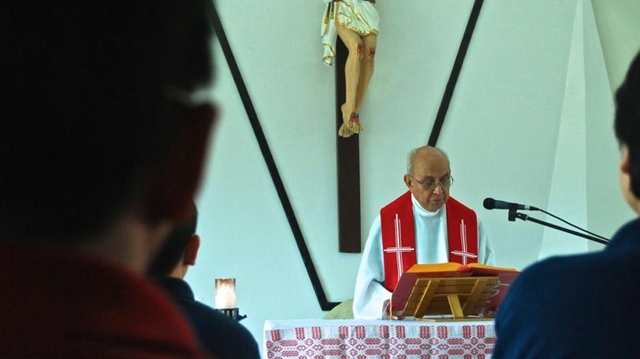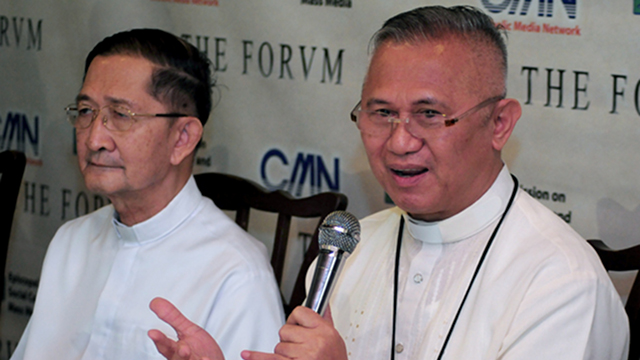--- repost from Rappler's PATERNO ESMAQUEL II ---
MANILA, Philippines – He said tax money has no “religious face,” and the bishop who criticized his stance on the Reproductive Health (RH) bill espouses a “very narrow” understanding of pluralism.
Jesuit constitutionalist Fr Joaquin Bernas on Monday, September 10, refuted the arguments of Antipolo Bishop Gabriel Reyes, who published a newspaper advertisement to express disagreement with him on the controversial measure.
In his latest column in the Philippine Daily Inquirer, Bernas referred to his previous article that Reyes criticized on behalf of the Catholic Bishops' Conference of the Philippines (CBCP).
Bernas earlier wrote: “The state should not prevent people from practicing responsible parenthood according to their religious beliefs nor may churchmen compel President Aquino, by whatever means, to prevent people from acting according to their religious beliefs.”
Reyes, chair of the CBCP Episcopal Commission on Family and Life, said the CBCP doesn't want to ban contraceptives, which can easily be bought in drugstores. He claimed the CBCP only wants to stop the government from promoting artificial family planning methods, which do not merely defy Catholic teaching but also “natural law.”
No freedom to choose
 In his column on Monday, Bernas noted a "clear implication" of Reyes' claim that people can easily buy contraceptives in drugstores: that "the world is free and anyone can buy these." He said: "This is simply not true. Only those who have the money can buy them."
In his column on Monday, Bernas noted a "clear implication" of Reyes' claim that people can easily buy contraceptives in drugstores: that "the world is free and anyone can buy these." He said: "This is simply not true. Only those who have the money can buy them."
Lack of money prevents the poor from fully exercising their freedom to choose, Bernas added. He echoed the views of RH bill advocates who claim that by not funding contraceptives, the government is effectively preventing the poor from accessing these. “The exercise of freedom is only possible if one has the capacity to choose,” said the priest, who is also dean emeritus of the Ateneo de Manila Law School.
“The government is thinking of the vast majority of poor and uninstructed people who do not know what the choices are or who cannot afford to make their free choice and are sometimes driven to abortion. What the government hopes to do is not to compel them to use contraceptives but to capacitate them to make their free choice and perhaps even save them from abortion,” he explained.
ALL-OUT WAR. CBCP president Cebu Archbishop Jose Palma (right) and Antipolo Bishop Gabriel Reyes (left) lead Catholic bishops' fight against the RH bill. Photo courtesy of CBCP
Bernas then noted Reyes' “implicit” desire for the government not to distribute contraceptives for free.
“One must distinguish between tax money and donated money. The use of donated money is limited by intentio dantis or the intention of the donor. Tax money, on the other hand, can be used for any legitimate public purpose authorized by Congress. Tax money has no religious face. Whether or not its use is licit can ultimately be decided by the Supreme Court,” Bernas said.
'Narrow view'
Bernas also criticized Reyes' view that “natural law prohibits contraception and natural law binds everyone because '(by) studying through correct reasoning the nature of the human person, we arrive at this teaching regarding contraception.'”
He was referring to Reyes' claim that the Catholic Church's opposition to the RH bill is based on “natural law.” The Catechism of the Catholic Church defines natural law as an expression of moral law that is “universal” and appeals to “common principles.”
“One might flippantly answer by asking whose correct reasoning are we talking about? Plato, Aristotle, Aquinas, Grisez, Chappell, Finnis, etc.? But the statement deserves more than just a flippant answer. And it is not flippant to say that many serious thinkers have also studied the human person and have not arrived at the conclusion that contraception is evil,” Bernas wrote.
Bernas, who earlier said he adheres to Catholic teaching on contraceptives, said he doesn't want to dispute natural law as the Catholic Church teaches it.
“But I believe that the bishop’s view is a very narrow understanding of the pluralism which is part of our constitutional system. Pluralism, which flows from freedom of religion, is not just about the plurality of theistic religions. Neither is it merely a matter of which God or god to worship,” he said.
“Constitutionally protected pluralism includes nontheistic religions such as Buddhism, ethical culture, secular humanism, and a variety of ethical philosophies. Of course, it also includes the bishop’s understanding of natural law. But his understanding is just one of the many, including those which do not arrive at the bishop’s conclusion,” Bernas added.
Like Bernas, other Filipinos have cited religious freedom in supporting the RH bill. In a recent piece for Rappler's Move.PH, contributor Joey Ramirez stressed that the Philippines is a secular democracy.
“Since our rights as citizens are not in any way hampered by our choice of religion (one in particular)... then the laws we have governing everyone should also be equally unhampered by any religion (one in particular), and should be applied equally regardless of religion,” Ramirez wrote.
In the present Congress, the RH bill has triggered the most contentious debates, and is said to need intervention from President Benigno Aquino III himself. For now, the bill is temporarily shelved to give way to the passage of the government's P2.006-T budget for 2013.



No comments:
Post a Comment